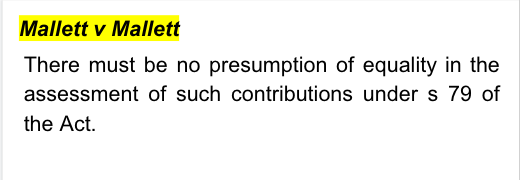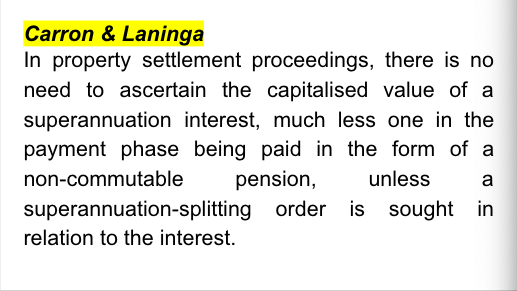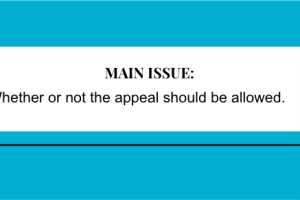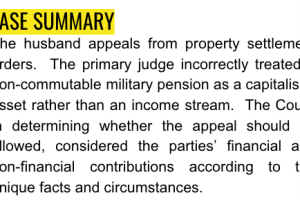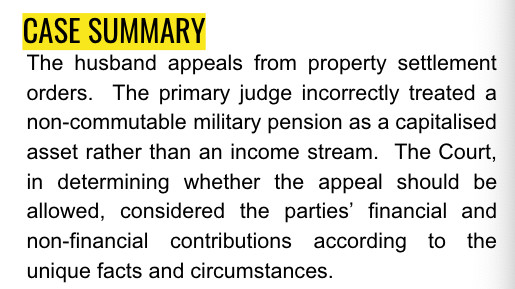- · 4853 friends
Husband Appeals Incorrectly Treated a non-commutable military pension as a capitalized asset rather than an income stream.

Preston & Preston [2022] FedCFamC1A 157 (5 October 2022)

The husband appeals from property settlement orders. The primary judge incorrectly treated a non-commutable military pension as a capitalised asset rather than an income stream. The Court, in determining whether the appeal should be allowed, considered the parties’ financial and non-financial contributions according to the unique facts and circumstances.

Facts
The parties married in 2006, separated in 2018, and divorced in 2020. The wife is 18 years younger than the husband. They have four young children, who live primarily with the wife. Happily, the parties resolved their dispute over the children, but could not compromise the dispute over the division of their property.
The trial proceeded in November 2021, with the wife seeking 52.5 per cent of the parties’ aggregated property and superannuation and the husband seeking 57.5 per cent (at [4]). As can be seen, the parties adopted positions 10 per cent apart, which made some difference when the total net value of their assets and superannuation was found to be $4,110,068 (at [42]). The appealed orders were pronounced and reasons for judgment were delivered in April 2022. The primary judge ordered that the husband would receive 58.5 per cent of the property and superannuation and the wife 41.5 per cent (at [95]).
The husband opposes how the primary judge treated his superannuation interest, received in the form of a defined benefit military pension in the payment phase (“the military pension”), which he retained and was not split between the parties (at [104]). He asserts the primary judge erroneously failed to properly consider the “nature, form and characteristics” of the military pension which, in effect, led to its incorrect treatment as a capitalised asset rather than merely as an income stream and then being double-counted as a future source of income.

Issue
Whether or not the appeal should be allowed.

Applicable law



Analysis
The wife began the trial foreshadowing a dispute between the parties over whether the military pension would be treated as a tangible asset or only as a financial resource but, in final submissions, she abandoned her initial application for a superannuation-splitting order. She did not contend for the military pension to be counted as an asset at its capitalised value and anticipated its treatment as only an income stream for the appellant. It was impossible to commute the military pension (at [91d]) and neither party ultimately sought a superannuation-splitting order in respect of it (at [14]–[15], [93c] and [104]), so the expert opinion evidence of it having a capitalised value of $638,109 (at [16e], [24] and [91a]) lost its utility.
Her Honour acknowledged the parties initially contested the inclusion of the military pension within the balance sheet as an asset (at [24]) but seemed to overlook the wife’s subsequent abandonment of her contention for its treatment as such. Without explaining why in the reasons for judgment, the primary judge counted it as an asset at the capitalised value (at [42]), even though she acknowledged neither party sought superannuation-splitting orders. The corollary of that conclusion was the husband’s presumed receipt of the military pension in the form of an asset at that capitalised value as an integral part of his proportional share of the divided property (at [107]), notwithstanding he could never liquidate it as an asset and its continued payment was contingent upon future review of his medical condition. The primary judge’s methodology caused the military pension to be impermissibly counted twice – first as an asset and then as a source of constant income.
Conclusion
The appeal is allowed. Within 21 days, each party shall file and serve written submissions of maximum 16 pages, to include submissions as to costs, and to be based on the same evidence before and the same findings made by the trial judge (save for any findings that have been impugned by allowing the appeal). The parties have liberty to jointly email to the chambers of the Chief Justice any terms of settlement within 14 days.



